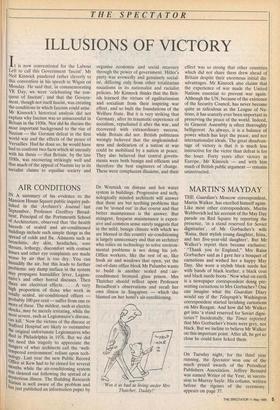THE SPECTATOR
ILLUSIONS OF VICTORY
It is now conventional for the Labour Left to call this Government 'fascist'. Mr Neil Kinnock pandered rather cleverly to this convention in his speech in Wigan on Monday. He said that, in commemorating VE Day, we were 'celebrating the con- quest of fascism', and that the Govern- ment, though not itself fascist, was creating the conditions in which fascism could arise. Mr Kinnock's historical analysis did not explain why fascism was so unsuccessful in Britain in the 1930s. Nor did he discuss the most important background to the rise of Nazism — the German defeat in the first World war and the effects of the peace of Versailles. Had he done so, he would have had to confront two facts which sit uneasily With his thesis — that Britain, by the late 1930s, was recovering strikingly well and that much of the appeal of Nazism lay in its socialist claims to equalise society and
organise economic and social recovery through the power of government. Hitler's party was avowedly and genuinely social- ist, differing only from other totalitarian socialisms in its nationalist and racialist policies. Mr Kinnock thinks that the Brit- ish learned the virtues of egalitarianism and socialism from their inspiring war effort, and so built the foundations of the Welfare State. But it is very striking that Germany, after its traumatic experience of socialism, repudiated it after the war, and recovered with extraordinary success, while Britain did not. British politicians wrongly believed that the singleminded- ness and dedication of a nation at war could be mobilised by a nation at peace. They also believed that central govern- ments were both benign and efficient and therefore the best engineers of change. These were complacent illusions, and their
effect was so strong that other countries which did not share them drew ahead of Britain despite their enormous initial dis- advantages. Mr Kinnock also claims that the experience of war made the United Nations essential to prevent war again. Although the UN, because of the existence of the Security Council, has never become quite as ridiculous as the League of Na- tions, it has scarcely ever been important in preserving the peace of the world. Indeed, its General Assembly is often thoroughly belligerent. As always, it is a balance of power which has kept the peace, and not internationalist ideals. The great disadvan- tage of victory is that it is much less instructive for the victor than defeat is for the loser. Forty years after victory in Europe, Mr Kinnock — and with him much of British public argument — remains uninstructed.














































 Previous page
Previous page